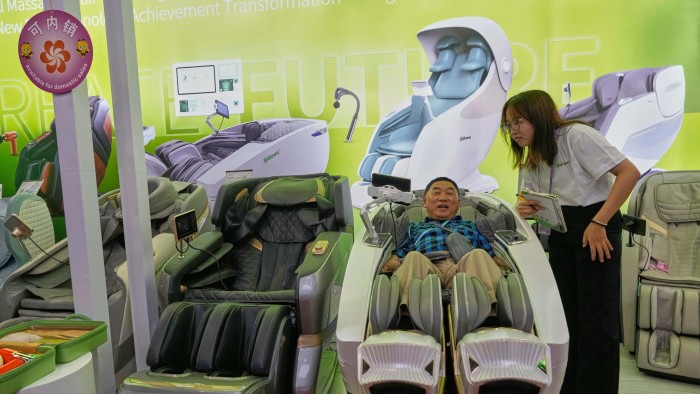Unlock the Editor’s Digest for free
Roula Khalaf, Editor of the FT, selects her favourite stories in this weekly newsletter.
US business executive Kinu Kelly came to the 137th China Import and Export Fair in Guangzhou this week with one goal: to find Chinese suppliers who could make the goods she needs outside the country.
“Now, it’s imperative,” said the product development head from New York. “No exceptions.”
Kelly’s eagerness to diversify her supply chains is one way attendees at China’s largest and oldest trade show — known as the Canton Fair — are adapting to a new reality for global commerce after US President Donald Trump raised levies on most Chinese goods to as much as 145 per cent this month.
Established by Mao Zedong in 1957 to help the Communist country overcome a US trade embargo, the twice yearly Canton Fair has become China’s pre-eminent export show, serving as a crucial link between the country’s sprawling manufacturing base and its eager clients across the globe.
But Trump’s steep new levies — which China met with 125 per cent tariffs of its own — far exceeded what most exporters had viewed as a worst-case scenario before he took office, and have threatened to drive a decoupling between the world’s two largest economies.
In the halls of the Canton Fair in Guangzhou, stunned American buyers and Chinese producers scrambled to find new markets for their wares or alternative trade routes to avoid the tariffs, while warehouses filled up with piles of unwanted stock rendered newly unaffordable.
“Our prices for the big supermarkets are already very, very low. We have no way of accepting such a high tariff,” said Ren Chaoqun, a product manager at XStrap, which produces car roof straps for US clients including Walmart at a factory with more than 100 staff in China’s eastern Jiangsu province.
Ren and other suppliers added that many products were tailored to specific American clients, meaning finding customers in different markets could involve steep regulatory hurdles or removing branding.
With few obvious solutions, Ren expressed hopes that the two sides would meet swiftly to work out a deal. But neither has committed to a timeline for talks.
Many exporters at the 1.6mn sq m fair said that the new levies made selling to the US market unfeasible.
“It’s definitely hard,” said Shen Senjian, sales manager at AutoLine, a Jiangsu-based manufacturer of appliances for recreational vehicles such as coffee makers, which makes a third of its sales in the US.
“All of our US customers have paused all of their orders . . . the tariff is too high.”
“If they don’t talk it out, we’ll have no choice but to stop doing the US market,” Shen added. “We can only try and find more customers in Europe or in countries along the Belt and Road [President Xi Jinping’s signature international infrastructure initiative].”
Another option is to shift production out of China.
Many Chinese exporters began expanding their operations overseas after Trump imposed tariffs on the country in 2018 during his first term in office. Booths at the Canton Fair sported the flags of Vietnam, Thailand and other south-east Asian countries in an effort to lure US buyers wary of the costs of a “made in China” label.
Vera Li, sales specialist at Quanzhou Viition Gifts, a lighting and gifts manufacturer with plants in Cambodia and China’s coastal Fujian province, said Trump’s duties would accelerate plans to shift the balance of production to south-east Asia.

The company’s factory in Cambodia already has a regular staff of about 1,000 workers, compared with the 800 at its site in Fujian, and was planning on expanding with two new factories. The Fujian plant would gradually shift its focus from manufacturing and to design and research, she said.
But Trump’s threat of “reciprocal” tariffs on nearly all of America’s global trading partners — which he has postponed for 90 days — meant even exporters with overseas plants were not breathing sighs of relief.
The “reciprocal” levies were based on trade balances, meaning countries with large US surpluses such as low-cost manufacturers Vietnam, Cambodia and Bangladesh, could face levies as high as 49 per cent.
“We haven’t been affected so far, but in the future we don’t know, you have to wait for the policy,” said Nancy Yi, sales manager at Flextech Co, a producer of solar panels and energy storage units for the US market with two factories in China’s central Hubei province and Vietnam. “At the moment, there isn’t too clear a solution.”
Nonetheless, for US businesses with products to source, finding Chinese companies running plants in south-east Asia could be the only option, said sourcing executive John Chen.
“Our goal is to get the product outside of China, manufacture and deliver [it],” he said. “That’s a priority.”
“[If] the US also tariffs Vietnam, Cambodia, Thailand, Indonesia, [then] we have no choice” but to pay them, Chen said. He added that Trump’s objective of pushing companies to reshore manufacturing to the US was “impossible”.
“The supply chain doesn’t exist.”
Read the full article here




